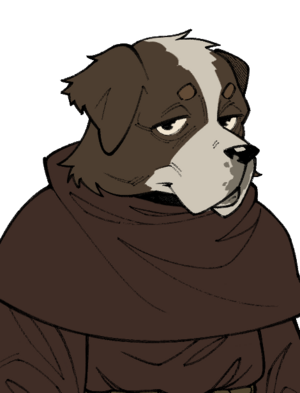Csongrád people: Difference between revisions
(Categorization) |
(Rewritten) |
||
| (2 intermediate revisions by the same user not shown) | |||
| Line 1: | Line 1: | ||
'''Csongrád people''' are an [[Imperial Tribe | {{Template:Region icon Noble Dog}} | ||
{{Infobox ethnic group | |||
|group=Csongrád | |||
|image=Csongradi.png | |||
|image_caption= ''Portrait of a Csongrád Monk'' | |||
|population= | |||
|popplace= | |||
|langs= {{wpl|Hungarian Language|Imperial Standard}}, Tolna-Móra Dialect | |||
|rels=[[Atyaism|Imperial Faith]]<br>[[Northern Orthodox Atyaism]] | |||
|related=[[Mórahalom people|Mórahalom]], [[Ruzsa people|Ruzsa]], [[Palota people|Palota]], [[Petőfi people|Petőfi]], [[Csépa people|Csépa]], [[Öcsöd people|Öcsöd]], [[Szombatság people|Szombatság]] | |||
}} | |||
'''Csongrád people''' are an [[Imperial Tribe]] native to the [[Imperial County]] of [[Csongrád]] and are the [[Békéltető]] constituent tribe within the [[Sió family]]. The Csongrád are closely related in culture and linguistics to the tribes of the [[Mórahalom people|Mórahalom]], [[Ruzsa people|Ruzsa]], [[Palota people|Palota]], [[Petőfi people|Petőfi]], [[Csépa people|Csépa]], [[Öcsöd people|Öcsöd]], and [[Szombatság people|Szombatság]]. These make up the Csongrád-Mórahalom subfamily. The Csongrád are one of the most widespread Imperial tribes due to their religious and administrative influences on the [[Imperial Faith]], and make up over 90% of all monks as well as 85% of all religious authority figures within [[The Empire (Noble Dog)|The Empire]]. They are native to the [[Imperial North]]. Much of the land that the Csongrád live on within the Imperial North historically was inhabited by the [[Ároktő people|Ároktő]]. | |||
Csongrád live primarily within the Imperial North, as well as some parts of the [[Imperial West]], the [[Imperial Central]] and the [[Imperial South]]. Much of their homeland and places they inhabit is within or surrounds the [[Tolna Mountain Range]], and as a result have tailored their culture and lifestyle towards living in the harsh {{wpl|tundra climate}}. The Csongrád have had a notable mix of agrarian products and animal meat to trade. The Csongrád provided food for the earlier renditions of Morahalom nomads that typically traveled throughout the mountain range, leading to their influence on the Morahalom during the Proto-Imperial Era. Most notable is their spread of the [[Monk Mating Dance]], a unique dance that the Csongrád are credited for that is typically done during times of celebration. The Csongrad also adopted the [[Snout Festival]], an annual festival of Morahalom origin that celebrates the coming of a new year. | |||
Politically, the Csongrád turned from seclusion into active members of the [[Northern Coalition]]. During the [[War of the Northern Coalition]], the Csongrad joined forces with the other Sio tribes against the [[Balaton Kingdom]]. Within Imperial politics, the Csongrád have two noble families: the [[House of Prohászka]] and the [[House of Báncsa]]. As a Békéltető constituency, The Csongrad are a constitutional member of the [[Imperial Diet]] and are thus charged with the selection of a new Noble House every century. | |||
==Origins== | |||
===Homeland=== | |||
==History== | |||
[[Category:Noble Dog]][[Category:Imperial Ethnicity]] | [[Category:Noble Dog]][[Category:Imperial Ethnicity]] | ||
Latest revision as of 20:13, 21 June 2023
 Portrait of a Csongrád Monk | |
| Languages | |
|---|---|
| Imperial Standard, Tolna-Móra Dialect | |
| Religion | |
| Imperial Faith Northern Orthodox Atyaism | |
| Related ethnic groups | |
| Mórahalom, Ruzsa, Palota, Petőfi, Csépa, Öcsöd, Szombatság |
Csongrád people are an Imperial Tribe native to the Imperial County of Csongrád and are the Békéltető constituent tribe within the Sió family. The Csongrád are closely related in culture and linguistics to the tribes of the Mórahalom, Ruzsa, Palota, Petőfi, Csépa, Öcsöd, and Szombatság. These make up the Csongrád-Mórahalom subfamily. The Csongrád are one of the most widespread Imperial tribes due to their religious and administrative influences on the Imperial Faith, and make up over 90% of all monks as well as 85% of all religious authority figures within The Empire. They are native to the Imperial North. Much of the land that the Csongrád live on within the Imperial North historically was inhabited by the Ároktő.
Csongrád live primarily within the Imperial North, as well as some parts of the Imperial West, the Imperial Central and the Imperial South. Much of their homeland and places they inhabit is within or surrounds the Tolna Mountain Range, and as a result have tailored their culture and lifestyle towards living in the harsh tundra climate. The Csongrád have had a notable mix of agrarian products and animal meat to trade. The Csongrád provided food for the earlier renditions of Morahalom nomads that typically traveled throughout the mountain range, leading to their influence on the Morahalom during the Proto-Imperial Era. Most notable is their spread of the Monk Mating Dance, a unique dance that the Csongrád are credited for that is typically done during times of celebration. The Csongrad also adopted the Snout Festival, an annual festival of Morahalom origin that celebrates the coming of a new year.
Politically, the Csongrád turned from seclusion into active members of the Northern Coalition. During the War of the Northern Coalition, the Csongrad joined forces with the other Sio tribes against the Balaton Kingdom. Within Imperial politics, the Csongrád have two noble families: the House of Prohászka and the House of Báncsa. As a Békéltető constituency, The Csongrad are a constitutional member of the Imperial Diet and are thus charged with the selection of a new Noble House every century.